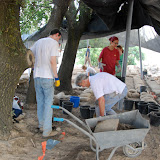Pan-Islam is the real undercurrent in the two civil wars now raging, one in Lebanon and the other in Gaza.
However, finally, there is clarity. The present conflicts have brought the hidden agenda out into the open. Gaza’s continual lobbing of Kassem rockets is merely a tool to keep Israel in the blame-game, and a smoke screen lest the truth be exposed. The conflict now raging in Lebanon is another example of a splintered Palestinian Islamic group within their "refugee" camp caught up in the power struggle detailed here.
Under the surface of the smoke and gunfire of both conflicts is the complex issue of control. Before Iran’s Ayatollah Khomeini declared the Islamic Revolution’s intentions in 1979, Arab states imagined a powerful pan-Arabic Islamic entity that would rule the Middle East.
Khomeini’s bold move trumped pan-Arabism with pan-Islam. His Islamic Revolution, slow in getting started with Iranian students planting themselves in western Universities, is now shaking the foundations of the world. Pan-Islamic focus included all the world within the quest for an Islamic Empire upon which the sun would never set. Remaining only within the borders of Middle East would not be enough.
Pan-Arabism – the ideology that all Arab nations should unify for strength - wasn’t broad enough to serve Islam’s greater goals. Ayatollah Khomeini’s declarations that all the world must be conquered for Islam was published in great detail in the late 1970s. Iran’s programs to make that happen were also available to the public through a U.S. Congressional Task Force on Unconventional Warfare and Terrorism. Yosef Bodansky, former Director of that task force wrote a book called Target the West: Terrorism in the West Today (see Amazon.com booklink on this blog) which was published in 1993. In that book, two Iranian airports dedicated to flying large aircraft into tall buildings were exposed clearly. Fifteen years of research went into the congressional report that became that book. The book has been retitled, “Target the West.” The present conflicts stem from the problem that dogged pan-Arabism – namely, who will be the larger-than-life leader.
That same problem dogs Iran’s Islamic Revolution as it has spread to other countries. The splintering of Islam into Sunni and Shi’ite, countless militant groups, Iranian and Syrian supported revolutionary groups like Hezbollah, and Hamas guaranteed the present conflict, the only question was “when?" The world was shocked to learn that Hezbollah’s parasitic government forbade Lebanon’s military from entering its self-declared boundaries in Beirut. Hezbollah’s expansion became known only from Israel’s summer war in 2006.
The present conflict has now revealed that 12 Palestinian camps scattered throughout Lebanon have diplomatic immunity and its Arafat-founded PLO government system has also restricted Lebanon’s government from entering their confines. What kind of government allows such dangerous Fifth Column cells to grow up in its midst? However, exposing Lebanon’s weakness is not the issue. The issue is that this present conflict has exposed the Islamic Revolution. The fight for supremacy fuels Middle East conflicts from Iraq, Afghanistan, Pakistan, Kashmir, the Philippines, and every other Islamic hotspot.
The surface reason for Lebanon’s Tripoli conflict was simple: A bank robbery went wrong and Lebanese police entered a forbidden area to make arrests. Robbers lost their lives and the transgression of Lebanon’s police force drew ire from surrounding revolutionary cells (also constituting off-limits areas to Lebanon) who responded to their comrades in revolution. Thus, a veritable war has ensued the past 2 days between this virtually unknown Islamic group and the Lebanese army, such as not been seen in Lebanon in over 17 years. Likewise, Hamas and Fatah continue to battle for governing power in Gaza.
All the while, Israel suffers from the breeding grounds that are Gaza and Lebanon where Islamic intentions of the revolution are matured.
Few know that a message was posted to a password-protected jihadist forum as far back as November 29, 2006, containing an announcement by the Fatah al-Islam Movement, in which the group announces that it has split from the “apostate seculars” of the Palestinian Fatah party. Fatah al-Islam observes jihad as the only means of victory and liberation for the Palestinian people. Their message was distributed to the Nahr al-Bared refugee camp near Tripoli. Muslims are encouraged to join their ranks and training camps because victory requires the “complete effort” of the Muslim Nation (i.e., "The Empire of Pan-Islam"). The message also states: “Know that our goal is fighting the Jews and all who support them from the Zionist Crusaders of the West and liberating our sacred [land]. So get out of the way. Don’t be the first to defend them. We warn everyone who wants to hurt our movement, because by Allah we did not take this step but only wishing for martyrdom”.
According to media reports, two-hundred Arab militants arrived in Lebanon at a Palestinian refguee camp in the north, and joined the Fatah-Intifada movement. They soon announced their split, and are purportedly headed by Shaker Issa, a former Palestinian Fatah official who had previously been expelled from the group.
Subscribe to:
Post Comments (Atom)


No comments:
Post a Comment